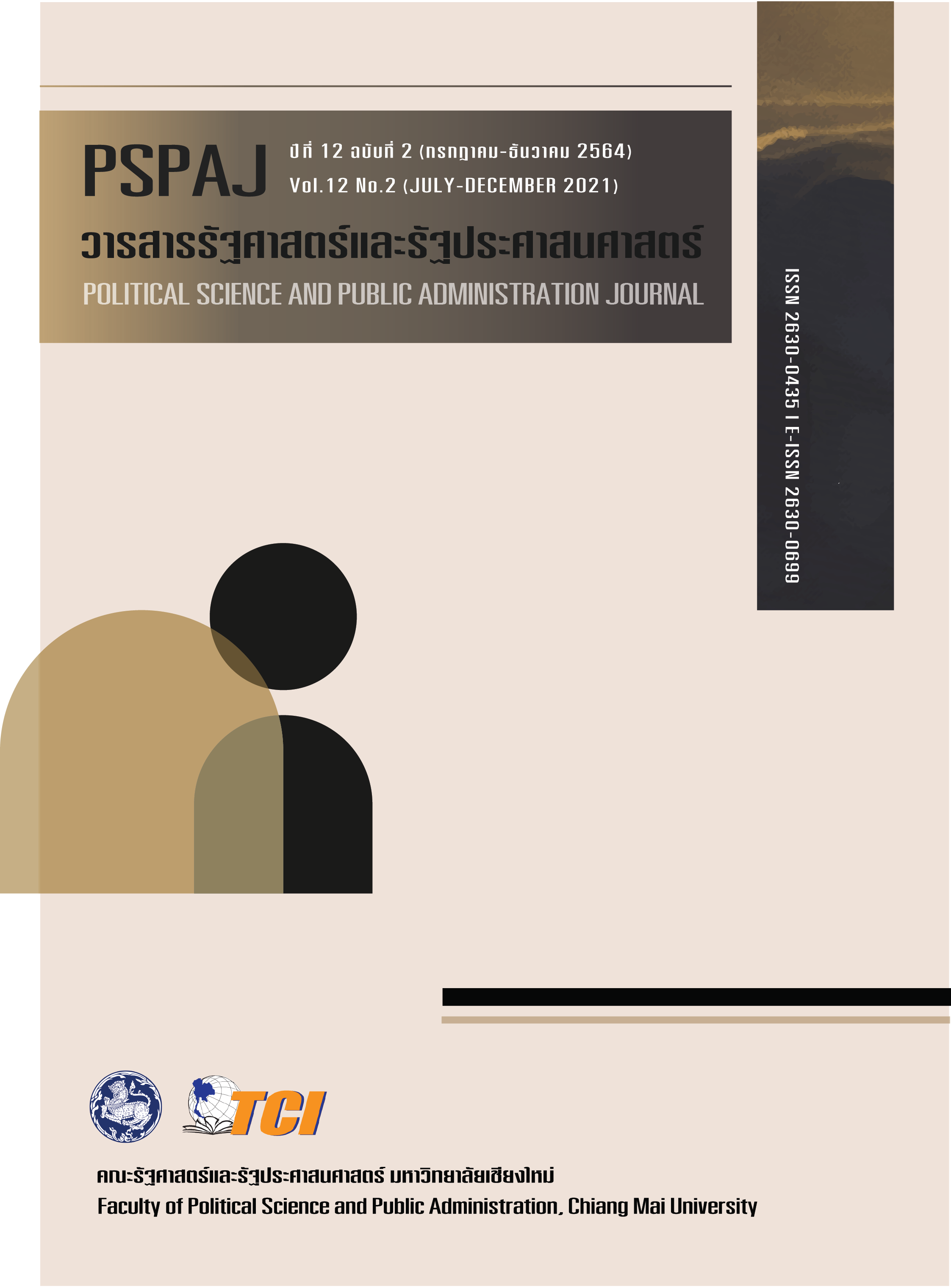ความสัมพันธ์ระหว่างโครงการเกษตรแปลงใหญ่กับระบอบการเมืองช่วง พ.ศ. 2557-2561: กรณีศึกษาโครงการเกษตรแปลงใหญ่ในภาคตะวันออก ประเทศไทย
Main Article Content
บทคัดย่อ
บทความนี้มีเป้าหมายในการศึกษาอยู่สองประการ ประการแรก เพื่อศึกษานโยบายด้านการเกษตรผ่านโครงการเกษตรกรรมแปลงใหญ่ ภายใต้บริบทของระบอบการปกครองของไทยช่วง พ.ศ. 2557-2561 และประการที่สอง เพื่อศึกษากระบวนการนโยบายเกษตรกรรมแปลงใหญ่ของรัฐและระบบราชการ ในการทำงานระดับพื้นที่ภาคตะวันออก โดยใช้กรอบการศึกษาจากระบอบที่ไม่เป็นประชาธิปไตยกับกระบวนการนโยบายสำหรับการอธิบายลักษณะเฉพาะของระบอบการเมืองไทยช่วงปี พ.ศ. 2557-2561 ผ่านการสำรวจเอกสารการสัมภาษณ์เชิงลึก และการจัดเวทีระดมความคิดเพื่อเก็บข้อมูลในระดับพื้นที่ภาคตะวันออก จำนวน 6 เวที ใน 3 จังหวัด (ฉะเชิงเทรา ชลบุรี ระยอง) ผลการศึกษาพบว่า การพัฒนาเศรษฐกิจผ่านโครงการเกษตรกรรมแปลงใหญ่ภายใต้ระบอบการปกครองที่ไม่เป็นประชาธิปไตยช่วง พ.ศ. 2557-2561 เน้นในเรื่องการตัดสินใจและต้องการผลลัพธ์อย่างรวดเร็วจากกระบวนการนโยบาย เนื่องจากเป้าหมายใน 3 ด้าน ประกอบด้วย 1) การสร้างความชอบธรรมผ่านผลงาน 2) ความสัมพันธ์ระหว่างรัฐกับการเมืองของนักวิชาการในการสร้างนโยบายที่เน้นกระบวนการรวมกลุ่มของเกษตรกร มากกว่าการช่วยเหลือด้านผลผลิต และ 3) การใช้กลไกที่เป็นอำนาจพิเศษในการช่วยตัดสินใจนโยบาย โดยในพื้นที่ภาคตะวันออกพบว่านโยบายเกษตรกรรมแปลงใหญ่ที่มีทั้งประสบความสำเร็จและล้มเหลว เพราะข้อจำกัดในเรื่องเวลาและการนำนโยบายไปปฏิบัติที่ภาคราชการต้องเผชิญ ทำให้นโยบายต้องเป็นไปอย่างค่อยเป็นค่อยไปมากกว่าการเปลี่ยนแปลงอย่างรวดเร็วตามความต้องการของรัฐบาล
Downloads
Article Details
- เนื้อหาและข้อมูลที่ลงตีพิมพ์ในวารสารรัฐศาสตร์และรัฐประศาสนศาสตร์ถือเป็นข้อคิดเห็นและความรับผิดชอบของผู้เขียนบทความโดยตรง ซึ่งกองบรรณาธิการวารสารรัฐศาสตร์และรัฐประศาสนศาสตร์ ไม่จำเป็นต้องเห็นด้วย หรือร่วมรับผิดชอบใดๆ
- บทความและข้อมูล ที่ได้รับการตีพิมพ์ในวารสารรัฐศาสตร์และรัฐประศาสนศาสตร์ ถือเป็นลิขสิทธิ์ของวารสาร หากบุคคลหรือหน่วยงานใดต้องการนำข้อมูลไปใช้ประโยชน์ในทางวิชาการ ขอให้อ้างอิงแหล่งที่มาด้วย
เอกสารอ้างอิง
กรมการค้าภายใน. (2557). คำสั่งคณะรักษาความสงบแห่งชาติที่ 172/2557 เรื่อง แต่งตั้งคณะกรรมการนโยบายและบริหารจัดการข้าว. สืบค้นเมื่อ 21 มิถุนายน 2561, จาก http://www.dit.go.th/Content.aspx?m=21&c=119
กรมการปกครอง. (2559). คู่มือการดำเนินงานโครงการยกระดับศักยภาพหมู่บ้านเพื่อขับเคลื่อนเศรษฐกิจฐานรากตามแนวทางประชารัฐ. กรุงเทพฯ: กรมการปกครองกระทรวงมหาดไทย.
กระทรวงเกษตรและสหกรณ์. (2559). คู่มือการดำเนินงานระบบส่งเสริมการเกษตรแบบแปลงใหญ่. กรุงเทพฯ: กระทรวงเกษตรและสหกรณ์.
______. (ม.ป.ป.). ระบบส่งเสริมการเกษตรแบบแปลงใหญ่. สืบค้นเมื่อ 21 มิถุนายน 2561, จาก https://ssnet.doae.go.th/wp-content/uploads/2018/02/ 1.ระบบส่งเสริมการเกษตรแบบแปลงใหญ่.pdf
นิพนธ์ พัวพงศกร. (2556). ยุทธศาสตร์ข้าวไทย การวิจัยพัฒนาข้าวไทยและการมองไปข้างหน้า. กรุงเทพฯ: สำนักงานกองทุนสนับสนุนการวิจัย.
Fischer, F. (2009). Democracy and Expertise: Reorienting Policy Inquiry. New York: Oxford University Press.
Gandhi, J. (2008). Political Institutions under Dictatorship. Cambridge: Cambridge University Press.
Gandhi, J., & Przeworski, A. (2007). Authoritarian Institutions and the Survival of Autocrats. Comparative Political Studies, 40(11), 1279-1301.
Huntington, S. P. (1957). The Soldier and the State: The Theory and Politics of Civil-Military Relations. Cambridge, Massachusetts: The Belknap Press of Harvard University Press.
Johnson, C. (1982). MITI and Japanese Miracle: The Growth of Industrial Policy, 1925-1975. Stanford: Stanford University Press.
Levitsky, S., & Way, L. A. (2010). Competitive Authoritarianism: Hybrid Regimes After the Cold War. Cambridge: Cambridge University Press.
Linz, J. J. (2000). Totalitarian and Authoritarian Regimes. Colorado: Lynne Rienner Publishers.
Linz, J. J., & Stepan, A. C. (2001). Chapter 8: Toward Consolidated Democracies. In Diamond, L. & Plattner, M. F. (Eds.). The Global Divergence of Democracies. Baltimore: Johns Hopkins University Press.
Lipset, S. M. (1959). Some Social Requisites of Democracy: Economic Development and Political Legitimacy. The American Political Science Review, 53(1), 69-105.
Nasir, K. M., & Turner, B. S. (2013). Governing as Gardening: Reflections on Soft Authoritarian-ism in Singapore Journal of Citizenship Studies, 17, 339-352.
O'Donnell, G. A. (1988). Bureaucratic Authoritarianism: Argentina, 1966-1973. In McGuire, J., & Flory, R. (Trans). Comparative Perspective. Berkeley, Cal.: University of California Press.
Olson, M. (1993). Dictatorship, Democracy, and Development. The American Political Science Review, 87(3), 567-576.
Schedler, A. (2010). Authoritarianism's Last Line of Defense. Journal of Democracy, 21(1), 69-80.
Schumpeter, J. (2003). Capitalism, Socialism, and Democracy. In Dahl, R. A., Shapiro, I., & Cheibub, J. A. (Eds.). The Democracy Sourcebook (pp. 5-11). Massachusetts: The MIT Press.
Wongsatjachock, W. (2015). Politics of Expertise and Democratization in Thai Rice Policy: A Case Study of Rice Pledging Scheme. (Master Dissertation), Department of Politics, University of Sheffield, UK.


